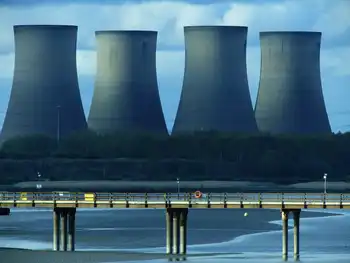France's nuclear power stations to limit energy output due to high river temperatures

Electrical Testing & Commissioning of Power Systems
Our customized live online or in‑person group training can be delivered to your staff at your location.

- Live Online
- 12 hours Instructor-led
- Group Training Available
France Nuclear Heatwave Output Restrictions signal reduced reactor capacity along the Rhone River, as EDF curbs output to meet cooling-water rules, balance the grid, integrate solar peaks, and limit impacts on power prices.
Key Points
EDF limits reactor output during heat to protect rivers and keep the grid stable under cooling-water rules.
✅ Cuts likely at midday/weekends when solar peaks
✅ Bugey, Saint Alban maintain minimum grid output
✅ France net exporter; price impact expected small
The high temperature warning has come early this year but will affect fewer nuclear power plants, amid a broader France-Germany nuclear dispute over atomic power policy that shapes regional energy flows.
High temperatures could halve nuclear power production at plants along France's Rhone River this week, as European power hits records during extreme heat.
Output restrictions are expected at two nuclear plants in eastern France due to high temperature forecasts, nuclear operator EDF said, which may limit energy output during heatwaves. It comes several days ahead of a similar warning that was made last year but will affect fewer plants.
The hot weather is likely to halve the available power supply from the 3.6 GW Bugey plant from 13 July and the 2.6 GW Saint Alban plant from 16 July, the operator said.
However, production will be at least 1.8 GW at Bugey and 1.3 GW at Saint Alban to meet grid requirements, and may change according to grid needs, the operator said.
Kpler analyst Emeric de Vigan said the restrictions were likely to have little effect on output in practice. Cuts are likely only at the weekend or midday when solar output was at its peak so the impact on power prices would be slim.
During recent lockdowns, power demand held firm in Europe, offering context for current price dynamics.
He said the situation would need monitoring in the coming weeks, however, noting it was unusually early in the summer for such restrictions to be imposed.
Water temperatures at the Bugey plant already eclipsed the initial threshold for restrictions on 9 July, underscoring France's outage risks under heat-driven constraints. They are currently forecast to peak next week and then drop again, Refinitiv data showed.
"France is currently net exporting large amounts of power – single nuclear units' supply restrictions will not have the same effect as last year," Refinitiv analyst Nathalie Gerl said.
The Garonne River in southern France has the highest potential for critical levels of warming, but its Golfech plant is currently offline for maintenance until mid-August, the data showed, highlighting how Europe is losing nuclear power during critical periods.
"(The restrictions were) to be expected and it will probably occur more often," Greenpeace campaigner Roger Spautz said.
"The authorities must stick to existing regulations for water discharges. Otherwise, the ecosystems will be even more affected," he added.











